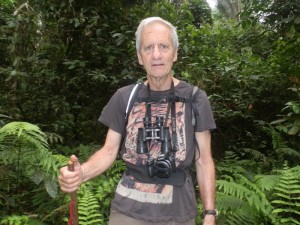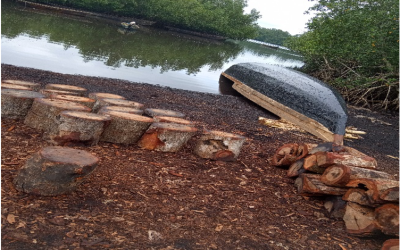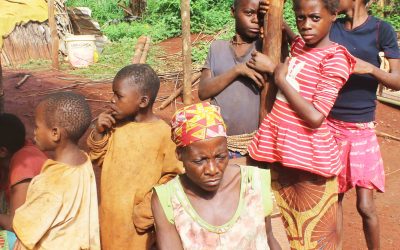
There is no better experience than taking time off the daily bustle and tussle of city life to camp in the rainforest. The Environment and Rural Development Foundation (ERuDeF) under its International Volunteering Program has since 2008 received over 200 persons coming from different parts of the world Canada, UK, USA, Australia, Netherlands, France, South Africa and Germany; to have a firsthand experience of the Tofala and Mak/Betchou rainforests in the Lebialem Highlands, South West Cameroon. These forest areas are home to a number of endangered species, including the Cross River Gorilla, the most threatened of all of Africa’s primates, Chimpanzees, Drills and various endemic bird and plant species. There is also a range of other species found in the forest like various monkey species, porcupine, cane rats, deer, bush dogs, bush cats, antelope, bush pigs, bush babies, blue duiker, elephant, and sitatunga.
Volunteers sometimes spend 2-6 weeks in the forest camping, trekking, tracking and recording information about gorillas and chimpanzees with special focus on feeding signs, number of nests (fresh and old nest), gunshot/gun shells, vocalization and many others. This experience usually leaves Volunteer wanting for more. A 28-year-old Finish Lady, Hanna-Maija Lantinen, spent 17 days in the Mak/Betchou rainforest and 21 days in the Tofala rainforest and was amazed by what she saw. “I saw elephants, heard the vocalization of chimpanzees and gorillas-fresh tracks and nests of gorillas and Chimpanzee during my stay in the forest. It was a fantastic experience and I am so happy to have lived those moments”. Hanna testified. To 68 year English retired Head Teacher, John Michael Daniel, who spent two weeks in the Tofala rainforest, the experience was incredible. “We were very quiet, walking up hill, tracing the apes, stopping and recording information as the needs arise. Then the exciting moment; we saw monkeys, got very close to chimpanzees and actually saw them shaking the branches responding to our presence. There was one occasion when we actually got footsteps in the forest and thought it was a person. We went to find out what was happening but could only see fresh banana peelings indicating that the foot steps were those of a gorilla. This was really exciting” John Revealed.
An American couple Mr/Mrs Howell Barret, after spending two weeks in the Tofala rainforest bathing in the forest waterfall could not hide their feelings; “water fall in the forest was awesome; we took our bath in the water fall, used it to clean our dresses It was particularly interesting for us to use our hand to wash dresses and dry them on the camp drying line in the forest”. Nontie A. Kabanyane from South Africa is one of those who visited the Tofala Rain Forest in the rainy season. She too had the same experience like the others but what particularly thrilled her was the wet and slippery nature of the rainforest. She was very happy to have learned about the different animals, fruits and trees in the forest. She was strangely happy eating the varieties of wild fruits in the forests. The experience has been the same for all the volunteers.
How to be Part of the Rainforest Experience
An application is sent directly to ERuDeF or to partner organizations like African Impact and African Conservation Foundation including your motivation and detailed information (Nationality, sex, age upon date of arrival, arrival and departure dates and time, contacts and other necessary information. An invitation letter is sent in response to this accompanied by the volunteering cost. Upon arrival, the volunteer is picked up at the airport and lodged in a Hotel in Buea for at least two days prior to departure to the field. An orientation meeting is always held for the day prior to departure to the field. During this orientation every departmental head at ERuDeF presents the functions of his/her department. The main activities on the field include: Great Apes bio-monitoring in the forest and Conservation Education in the forest adjacent communities. On their return from the field, a restitution meeting is organized with the Volunteer at the ERuDeF headquarters in Buea. The program ends with a visit at the Limbe Wildlife Centre and a sea fish lunch at the beach.
No specific required experience is needed, just a keen interest in wildlife and conservation is important. Volunteers between the ages of 20 and 70, must be very fit and prepared to trek through harsh environments with extreme temperatures.
Apart from the rainforest experience, volunteers conduct conservation education in the local schools and communities. Here Children are taught the ecology of apes, their importance, habitat needs and the importance of conserving them. Contests for the children are also organised and prizes awarded.
By Ndimuh Bertand Shancho


